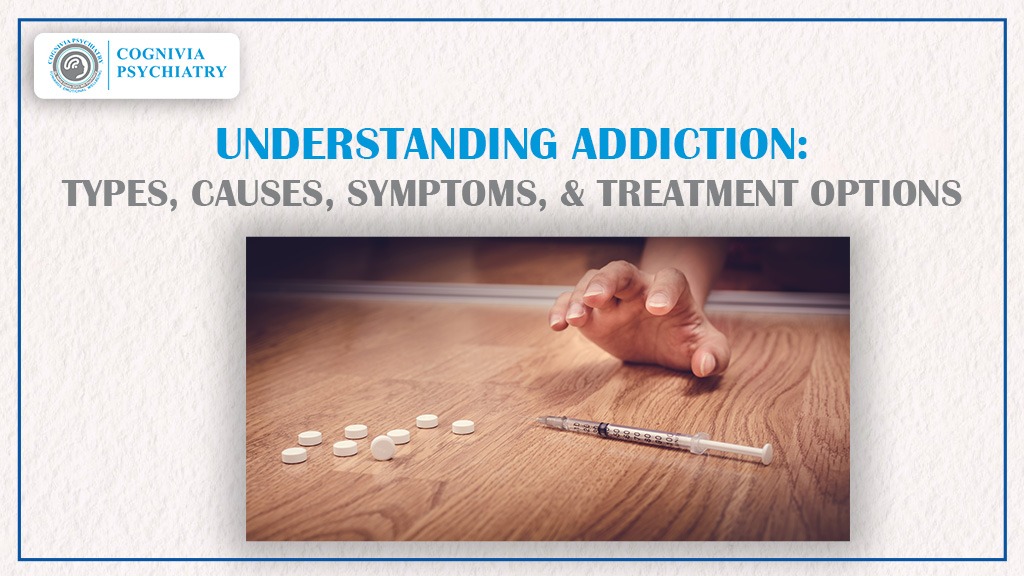
Addiction is a complex condition that affects millions of people worldwide. It is defined as a chronic disease that involves compulsive drug seeking and use despite the harmful consequences. Addiction can involve many different substances, including drugs, alcohol, and even behaviours like gambling or shopping. Understanding the different types of addiction, their causes, symptoms, and treatment options is crucial to help those who are struggling with this condition.
Types of Addiction:
- Substance Addiction: Substance addiction refers to the use of drugs, alcohol, or other substances that can lead to physical and psychological dependence. Some of the most commonly abused substances include opioids, stimulants, depressants, and hallucinogens. Substance addiction can cause a wide range of negative consequences, including legal problems, financial difficulties, and relationship issues. Factors that can contribute to substance addiction include genetics, environmental factors such as peer pressure or exposure to trauma, and mental health disorders such as depression or anxiety.
- Behavioral Addiction: Behavioral addiction refers to the compulsive use of behaviours that can cause harm, such as gambling, shopping, or sex. These behaviours can be just as addictive as substances and can lead to negative consequences such as financial problems, legal issues, and relationship difficulties. Behavioural addiction is caused by similar factors as substance addiction, including genetic predisposition, environmental factors such as peer pressure or exposure to trauma, and mental health disorders such as depression or anxiety.
Causes of Addiction:
- Genetics: Genetics can play a role in addiction. Research has shown that there is a genetic link between addiction and certain mental health disorders such as depression, anxiety, and bipolar disorder. Individuals with a family history of addiction may be more likely to develop an addiction themselves.
- Environmental Factors: Environmental factors such as peer pressure, stress, and trauma can also contribute to addiction. For example, individuals who have experienced trauma may turn to drugs or alcohol as a way to cope with their emotions. Social and cultural factors can also play a role in addiction, as individuals may be more likely to engage in addictive behaviors if they are normalized or encouraged within their community.
- Mental Health Disorders: Mental health disorders such as depression and anxiety can increase the risk of addiction. These disorders can lead to feelings of hopelessness and despair, which can lead individuals to turn to drugs or alcohol as a way to cope. Additionally, substance abuse can exacerbate existing mental health conditions, creating a cycle of addiction and mental health issues.
Symptoms of Addiction:
- Loss of Control: Individuals with addiction may find themselves unable to control their use of drugs, alcohol, or other substances. They may continue to use these substances despite negative consequences such as legal, financial, or social problems.
- Cravings: Individuals with addiction may experience intense cravings for their substance of choice. These cravings can be triggered by environmental cues or emotional triggers, leading to compulsive use.
- Tolerance: Over time, individuals with addiction may develop a tolerance to their substance of choice. This means that they will need to use more of the substance to achieve the same effects.
- Withdrawal: When individuals with addiction try to stop using their substance of choice, they may experience withdrawal symptoms such as nausea, vomiting, anxiety, and depression. These symptoms can be both physical and psychological in nature, and can make it difficult to quit using the substance.
Treatment Options:
- Detoxification: Detoxification is the process of removing the substance from the body. This process can be challenging, and individuals may experience withdrawal symptoms. It is important to undergo detoxification in a medically supervised setting to ensure safety. In some cases, medications may be used to manage withdrawal symptoms.
- Counseling: Counseling can help individuals with addiction to address the underlying causes of their addiction, such as mental health disorders or trauma. Counseling can be individual or group-based and can include behavioral therapy, cognitive-behavioral therapy, or dialectical behavior therapy. These therapies can help individuals to develop coping skills and strategies for managing their addiction and preventing relapse.
- Medications: Medications can be used to help individuals with addiction manage their withdrawal symptoms and cravings. Medications such as buprenorphine or methadone can be used to treat opioid addiction, while medications such as acamprosate or naltrexone can be used to treat alcohol addiction. These medications can be used in conjunction with counseling or other forms of treatment.
- Support Groups: Support groups such as Alcoholics Anonymous or Narcotics Anonymous can provide individuals with addiction with a supportive community of peers who are going through similar experiences. These groups can provide a safe space for individuals to share their struggles and receive support and encouragement.
- Inpatient Treatment: Inpatient treatment involves staying in a residential treatment facility for a period of time to receive intensive treatment for addiction. This can be particularly helpful for individuals who have tried other forms of treatment and have not been successful in managing their addiction.
- Holistic Approaches: Holistic approaches such as yoga, meditation, and acupuncture can be used to complement traditional addiction treatment. These approaches can help individuals to manage stress, anxiety, and other emotional triggers that may contribute to addiction.
In conclusion, addiction is a complex and multifaceted issue that can have serious consequences for individuals and their loved ones. Understanding the different types of addiction, the causes of addiction, and the symptoms of addiction is an important first step in addressing this issue. Treatment options for addiction include detoxification, counseling, medications, support groups, inpatient treatment, and holistic approaches. With the right support and treatment, individuals with addiction can successfully manage their addiction and lead healthy, fulfilling lives.




